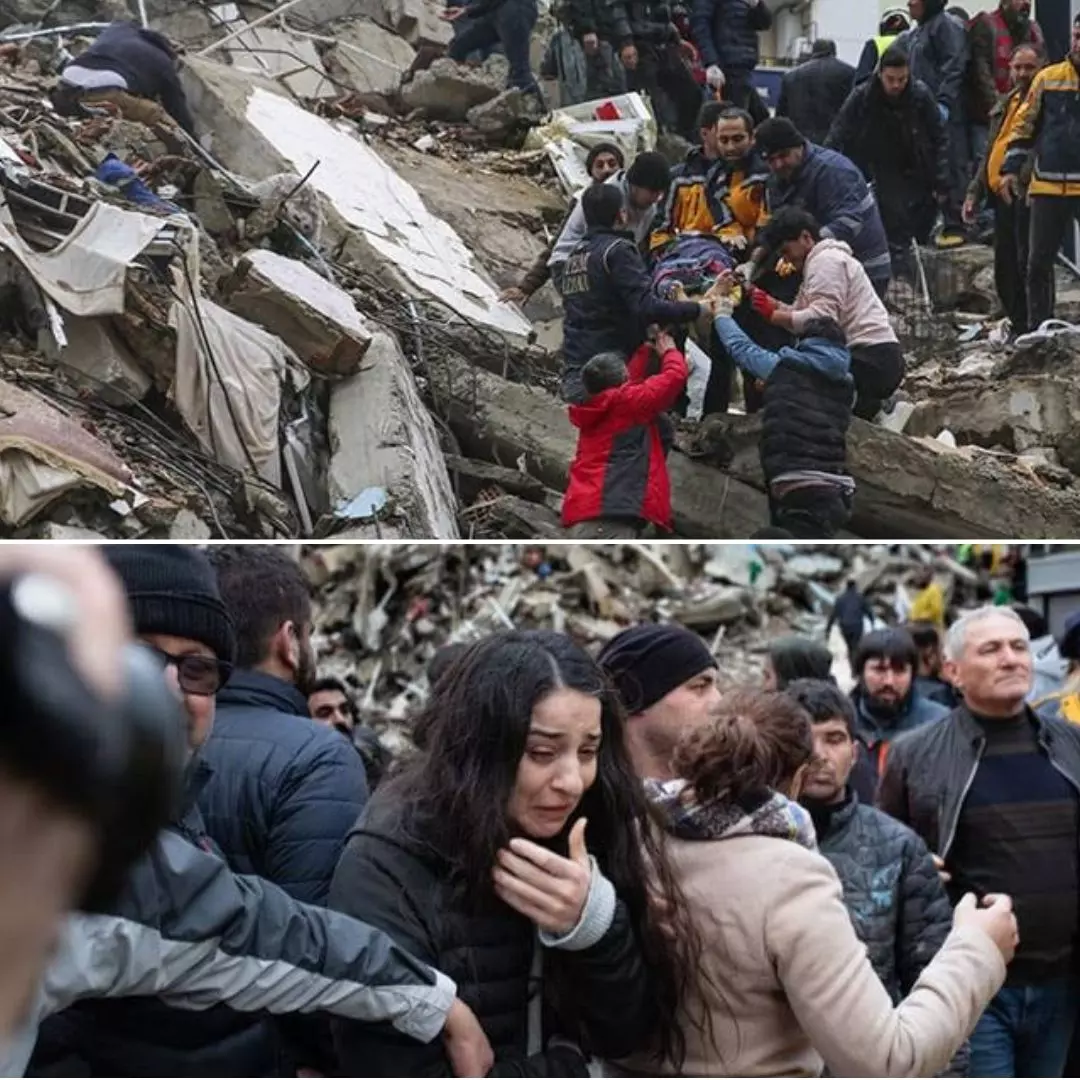
Image Credits: NDTV
Turkey-Syria Earthquake: India Sends 6th Flight Under Operation Dost As Death Toll Crosses 15,000 & One Indian Missing
Writer: Laxmi Mohan Kumar
She is an aspiring journalist in the process of learning and unlearning many things. Always up for discussions on everything from popular culture to politics.
Others/World, 9 Feb 2023 6:58 AM GMT | Updated 9 Feb 2023 8:55 AM GMT
Editor : Jayali Wavhal |
She writes about gender issues, human interest, and environment.
Creatives : Laxmi Mohan Kumar
She is an aspiring journalist in the process of learning and unlearning many things. Always up for discussions on everything from popular culture to politics.
The Turkey-Syria earthquake of 2023 was the country's most powerful quake in more than 80 years. With the United Nations Syria coordinator appealing to people to "put politics aside and do our humanitarian work," here's how India has been responding to the crisis.
Five back-to-back earthquakes since February 6 claimed the lives of over 15,000 people and left thousands injured in Turkey and Syria. The earthquake of magnitude 7.8 on the Richter scale, centred in the Pazarcik district, jolted Kahramanmaras and hit several other provinces, including Gaziantep, Sanliurfa, Diyarbakir, Adiyaman, Malatya, Osmaniye, Hatay, Adana, and Kilis. This was the country's most powerful quake in more than 80 years since the 1939 earthquake in eastern Erzincan province that killed 33,000.
Later in the day, an earthquake of 7.6 magnitude centred in Kahramanmaras's Elbistan district jolted the region. The earthquake was also felt in several neighbouring countries, including Lebanon and Syria. Following this, a third earthquake of magnitude 6.0 hit Goksun, Turkey. The Turkish president on February 7 declared a 'state of emergency' in 10 worst-hit provinces for the next three months, and rescue missions continue to save survivors trapped under debris in the freezing winter. Here are all the updates coming in from the disaster-struck Turkey and Syria:
- Earthquake shakes war-struck Syria to its core. For years, the people of Aleppo have dealt with the bombardment and terror attacks in the country that have taken their loved and near ones. With raging attacks came along Syria's economic downslide, inflation and poverty. Amidst this scenario, Syria will now be dealing with the devastation that has come along with the earthquake.
- In Syria one of the longest continuously inhabited areas on the planet within the so-called Fertile Crescent was reportedly struck by the earthquake. This region witnessed the emergence of different civilisations, from the Hittites to the Ottomans. Even though before the tragedy, several buildings often toppled due to poor infrastructure and decades of war, the earthquake shook it to a stage of posing a threat to the people.
- In Turkey, some of the heaviest devastations were seen near the quake's epicentre between Kahramanmaras and Gaziantep. The entire city blocks lay in ruins, and almost 3,000 buildings collapsed in seven different provinces, including public hospitals. Several social media posts showed structures that date back over 2,000 years turned to rubble after the quake.
- The death toll continues to rise every second. Along with the earthquake came the challenge of freezing cold weather, with the temperature dipping to below minus five degrees Celsius. Thousands of survivors had to spend their nights in cars and makeshift tents, not being able to return home. Some parents walked the streets carrying their children in blankets as it was warmer than sitting in tents. Meanwhile, rescue missions continue with full strength to save lives. Recently a two-month-old baby was pulled out alive after three days under the rubble in Turkey.
- Residents conveyed that they felt alone in responding to the disaster due to the scale of the damage and the lack of help in certain areas. A report by the Live Mint quoted a resident, Hassan, saying, "There are now more people under the rubble than those above it." With a countable few ten people and no machinery, they have been attempting to pull out more than 500 people who are trapped under the rubble.
- The White Helmets, who have been leading the rescue efforts, have appealed for international help. United Nations (UN) resident Syria coordinator El-Mostafa conveyed that this is the time to "put politics aside and do our humanitarian work."
- Several countries have been reaching out to help and provide aid to the quake-struck regions. Dozens of nations, including China and the Gulf nations, have pledged to provide aid in the form of search teams and relief supplies. Taiwan's president Tsai Ing-wen and Vice President William Lai will each be donating a month's salary for the relief efforts in addition to the aid that is already being sent. An official statement from the president's office mentioned that they "hope to do their part to help Turkey rebuild its homeland as soon as possible."
- Operation Dost from India continues as the sixth flight reaches Turkey. External Affairs (EA) Minister S Jaishankar stated that search and rescue teams, dog squads, essential search & access equipment, medicines, and medical equipment are being sent as a part of the mission. Furthermore, medical treatment is being given at the Indian Army's field hospital set up in Hatay. Indian state Kerala additionally announced a relief package of ₹10 crores for Turkey and Syria.
- On February 8, the MEA said that one Indian was missing and ten others were stuck but safe in remote regions of Turkey. Specialist teams from India have commenced their search and rescue operations and have set up a control room in Adana in Turkiye. Regarding the missing Indian, Secretary of the MEA, Sanjay Verma, said, "We have one Indian national missing who was on a business visit to Turkiye. He has not been traced in the last two days. We are in touch with his family and the company in Bengaluru which employs him."
- Following the incidents and the criticisms, Turkish President Recep Tayyip Erdogan conceded "shortcomings" of the government's response to the earthquake. In a first, Syria, too, sought help and assistance from the European Union. The EU said it would be providing additional emergency support to both countries and emergency humanitarian assistance worth $7 million in one of the largest-ever search and rescue operations through its Civil Protection Mechanism.
Also Read: Old Videos Of Earthquakes Passed Off As Recent Devastating Earthquakes In Turkey And Syria
 All section
All section














